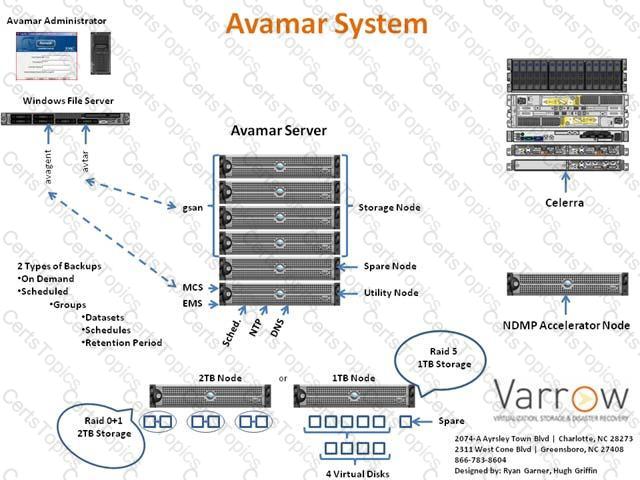Explanation: Explanation/Reference:

Are next type of node is the Storage Node, which run a process called gsan. This service communicates withthe avtar command on the individual backup clients. Avtar communicates with a storage nodes gsan process,then that storage node spreads the data across the available data nodes.
Avamar Node Types and Processes
There are several different types of Nodes within an Avamar Server. The Utility node is the identity of theAvamar Server and provides the bulk of the internal Avamar server processes such as: Avamar Administrator(used to manage the Avamar Server from a gui), cron jobs, DNS, NTP, external authentication, web access,MCS and EMS.
MCS (Management Console Server) provides centralized management including scheduling of backups,restore of backups, monitoring and reporting.
EMS (Enterprise Manager Server) provides web based management for multiple Avamar Servers as well asmonitoring and configuration for Avamar Replication.
Web Access provides access to documentation, backup plug-ins as well as remote File System restoreaccess to end users.
Are next type of node is the Storage Node, which run a process called gsan. This service communicates withthe avtar command on the individual backup clients. Avtar communicateswith a storage nodes gsan process,then that storage node spreads the data across the available data nodes.
A Spare Node is an active node that is present in a multi-node RAIN (Redundant Array of Independent Nodes)grid. The interesting thing about the Spare Node is that it is NOT a hot spare. There is a procedure in placethat needs to be followed when a failed Storage Node occurs. In fact, the Avamar Server doesn’t even care ifthe Spare Node is powered on, so if you are a “Green” conscience company, feel free to leave the Spare Nodepowered down. EMC Best Practice is to leave the Spare Node up and active though.Avamar Backups clients can be installed with 2 different types of client plug-ins: File System and Databases.The Avamar client uses 2 processes in the backup and restore process: Avtar and Avagent. The Avagentprocess listens for backup/restore work orders from the MCS service on the Utility Node using port 28002 andexecutes the avtar command that handles the backup/restore processes and communicates with the gsanservice on the storage nodes. This process is depicted in the included picture above.Lastly, in a previous blog, I discussed the 2 different licensable options for Avamar and how the disks arecomprised in each Storage Nodes type. These are depicted in the picture above as well as a breakdown ofhow the disks are structured.